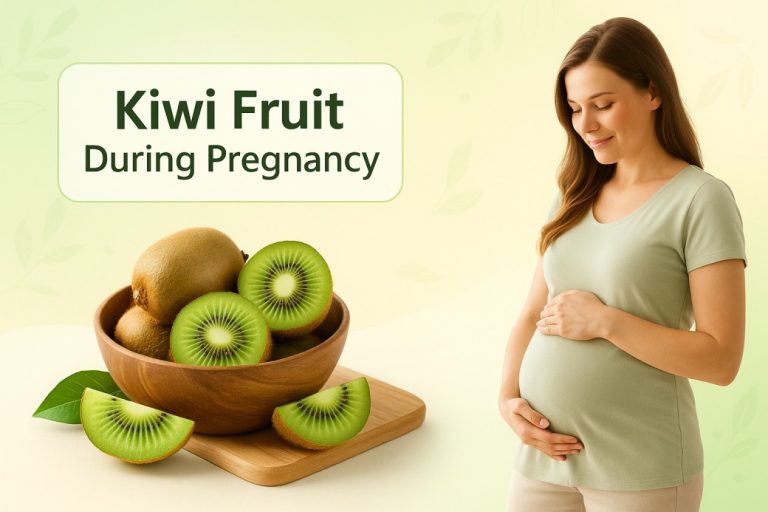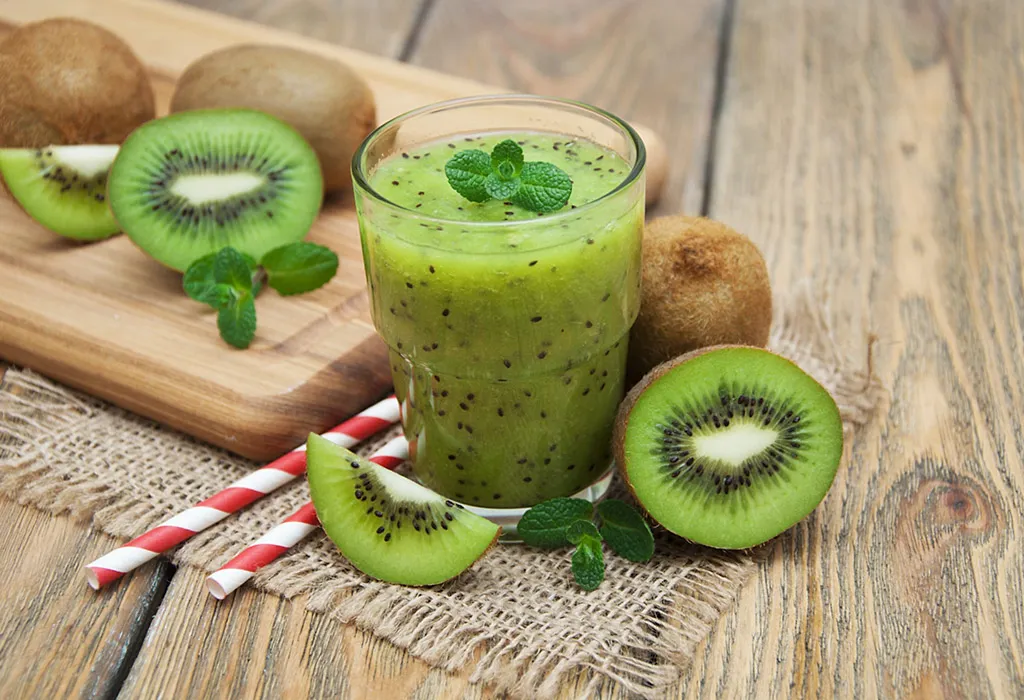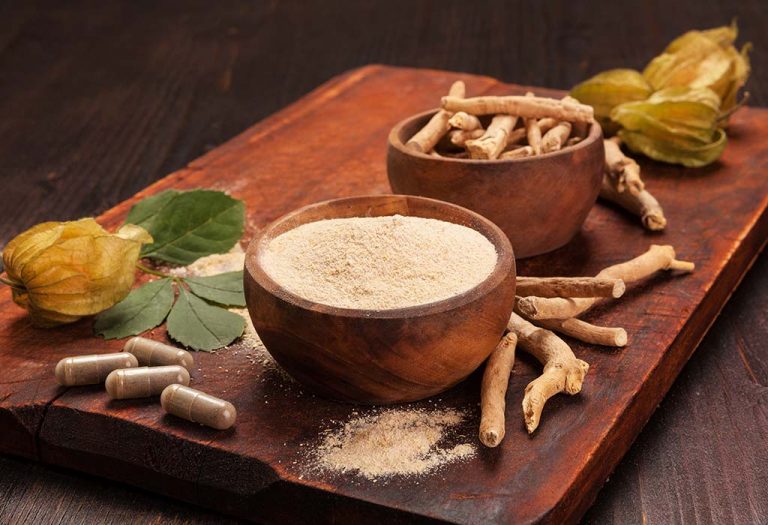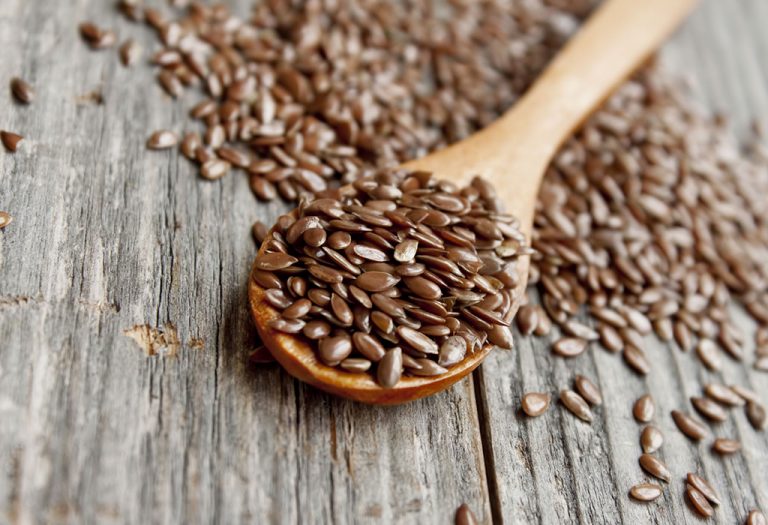Kiwi Fruit During Pregnancy – Benefits & Precautions

Pregnancy is accompanied by a strong urge to eat weird things that you may have previously despised of. There are several healthy foods that are perfect for cravings and ideal for the development of the foetus. While moms-to-be may have different cravings, especially sugar cravings, they are always recommended to choose a piece of fruit over chocolate or other sugary foods to keep a check on calories and avoid pregnancy issues like gestational diabetes. In such a scenario, many wonder, ‘Can pregnant women eat kiwi?’ Kiwi fruit during pregnancy is a great fruit, considering the fruit’s general health benefits. If you are already tempted by the juicy, tropical kiwi, read on to learn whether it is safe for you to eat kiwi fruit while pregnant.
Is Kiwi Good for Pregnant Women?
Let’s address the common question: “Can pregnant women eat kiwi?” Yes, kiwi is good in pregnancy. Kiwi or Chinese gooseberry is a fleshy, green fruit that is packed with plenty of health benefits for pregnant women aside from the fact that it is delicious! This superfruit is packed with vital nutrients: vitamin K, vitamin C, vitamin E, potassium, folate, dietary fibre, copper, choline, magnesium, and phosphorus. It provides over 140% of the daily recommended dose of vitamin C.
Rich in vitamin C and low in sugar and fat, kiwi is ideal for consumption during pregnancy. Also, it contains no cholesterol. The only reason you may need to avoid it is if you are susceptible to gastritis or hereditary allergy. Eating two to three kiwi fruits per day is perfectly safe during pregnancy (1).
Nutrients Present in 1 Medium-Sized Kiwi Fruit
The table below presents the nutritional chart for the 100-gram green, raw kiwi fruit.
| Nutrition | Amount |
| Calories | 61 kcal |
| Protein | 1.14 grams |
| Total Fat | 0.52 grams |
| Fibre | 3 grams |
| Vitamin A | 87 micrograms |
| Iron | 0.31 milligrams |
| Potassium | 312 milligrams |
| Folate | 25 micrograms |
| Vitamin C | 92.7 milligrams |
Source: USDA (2)
Health Benefits of Eating Kiwi Fruit in Pregnancy: Trimester-wise
If you are looking for vitamin-C-rich foods, you can try kiwi fruit for pregnancy. Listed below are some of the health benefits of kiwi during pregnancy:
1) First Trimester
Eating kiwi fruit in pregnancy’s first trimester is a golden way to improve your and your baby’s health and wellness. With a host of all-rounder benefits, here are the benefits to be gained in the first trimester of pregnancy.
1. Folate
Folic acid plays an integral role in the cognitive development of the foetus. It helps develop the brain and the nervous system and prevents neural defects in the unborn baby (3). It is a critical nutrient for the formation and maintenance of cells. It is also responsible for the development of the baby’s vital organs. Folate prevents congenital disabilities in babies, such as spina bifida, a medical condition in which the spinal cord is not fully developed. Having kiwi during the early pregnancy phase will also reduce the chances of having a miscarriage.
2. Vitamin C
Vitamin C is vital for the formation of neurotransmitters, which are crucial to brain function (4). Foods that are rich in antioxidants protect the mother-to-be from the harmful effects of free radicals. It is excellent for boosting energy levels and strengthening the immune system (5). Additionally, it also helps with iron absorption from iron-rich foods. Kiwi being rich in iron and vitamin C is perfect for pregnant women (6).
3. Calcium
Calcium is essential for the development of the baby’s bones, muscles, teeth, and heart. Kiwi fruit contains 5.5% calcium; if your dairy consumption is low or if you are lactose intolerant, it would be advisable to include calcium-rich kiwi in your diet. It also contains magnesium, which improves the absorption of calcium.
4. Hormonal Balance
Hormones can create havoc during pregnancy, as you may suffer from depression, feel tired, or feel stressed. A serving of kiwi can help balance hormones, which can prevent any mood swings from occurring.
5. Low Calories
Kiwi is a low-calorie, naturally sweet option that satiates cravings and hunger without adding pounds.
2) Second Trimester
With the second trimester comes new challenges, all of which can be eliminated or reduced by eating kiwi during pregnancy second trimester.
1. Promotes Digestion
Constipation is normal during pregnancy. You will need to include probiotics in your diet to help prevent diarrhoea, bloating, nausea, stomach discomfort, abdominal pains, and gastritis. Kiwi is rich in dietary fibre, which keeps the colon healthy. Fibre-rich foods are natural laxatives that aid digestion. Additionally, actinidine, which is a protease enzyme in green kiwi, helps stimulate upper gastrointestinal tract motility (7).
2. Rich Source of Vitamins and Minerals
Besides being rich in vitamin C, kiwi has large amounts of vitamin E, which protects you and your baby’s cells from damage. It promotes healthy skin.
3) Third Trimester
Consuming kiwi during pregnancy’s third trimester is one of the best ways to ensure a healthy you and a healthy baby. Here are some advantages:
1. Natural Sugars
Kiwi, like all fruits, contains natural sugars to help control your sweet cravings. Low in glycemic index, it does not lead to a major spike in insulin levels. It is essential in regulating blood sugar levels, as gestational diabetes during pregnancy is quite common (8).
2. Iron
Pregnant women are often afflicted with an iron deficiency, anaemia, caused by the lack of haemoglobin in the blood. Other symptoms of low iron include pale skin, poor appetite, and nausea. Iron is needed for the production of red blood cells. It also carries oxygen between cells and is essential for energy production. Kiwi provides 4% of iron per serving. It also facilitates the absorption of iron, thus preventing anaemia.
3. Strengthens the Immune System
The copper in kiwi assists in the brain development of children and also strengthens the immune system.
How to Include Kiwi in Your Pregnancy Diet?
Kiwi and pregnancy are a beautiful combination. It can be consumed in many ways, such as:
- Cut the fruit, scoop the fruit off the skin, and enjoy
- Include it in your salads with other fruits
- Add it to smoothies or yoghurt
- Freeze the slices or pulp and turn them into popsicles
- Have it in the form of a jam
- Kiwi puree or sauce as a side dish for meals
Risks Associated With Consuming Kiwi Fruit During Pregnancy
Being allergic to kiwi is uncommon. However, one might develop an allergic reaction to it or may consume it to the point where the effects are negative. It is advisable to consult your doctor before adding kiwi to your regular diet plan. Side effects of kiwi fruit for pregnant women are (9):
- Oral Allergies: Overconsumption of kiwi can cause itching or a tingling sensation in the mouth, leading to swelling of the lips and tongue. In some cases, it can trigger asthma, rashes, and hives.
- Skin Ailments: Overeating kiwi may cause acute urticaria, chronic urticaria, dermatitis, or even contact dermatitis. The risk is higher if you are allergic.
- Digestive Problems: In certain cases, overeating kiwi can cause diarrhoea, vomiting or nausea.
- Latex Allergy: Individuals with latex allergies are also prone to kiwi allergies. It is advisable to keep away from kiwi in such cases.
- Damage to the Pancreas: Kiwi is a rich source of vitamin C, vitamin E, serotonin, and potassium. When taken in large amounts, it can alter triglyceride levels in the blood and, in the long run, harm the pancreas.
- Side Effects: Kiwi fruit has anti-fungal properties and can have an additive effect when combined with anti-fungal medicines. If you are taking anticoagulants, heparin, aspirin, non-steroidal anti-inflammatory or antiplatelet drugs, consult your doctor before consumption of kiwi fruit.
How Much Kiwi Should You Consume During Pregnancy?
Ideally, a mom-to-be should have 1 cup of chopped fruits a day or one large piece of fruit (1). For a healthy and safe pregnancy, you can consume about 2-3 kiwi fruits per day. In case you are suffering from gastritis, allergies, or any digestive issues, consult your doctor before adding kiwi to your regular diet. If you are prone to acidity or rashes and allergies, kiwi can trigger acidic reactions and cause soreness in the mouth or tongue.
Kiwi Fruit Recipes for Pregnant Women
Kiwi and pregnancy are a great health combination. You can make various recipes from kiwi to include in your pregnancy diet.
1. Kiwi Banana Yoghurt Smoothie
This smoothie is sure to keep you hydrated and help manage pregnancy fatigue naturally. You can try this as a morning energy boost or mid-day snack.
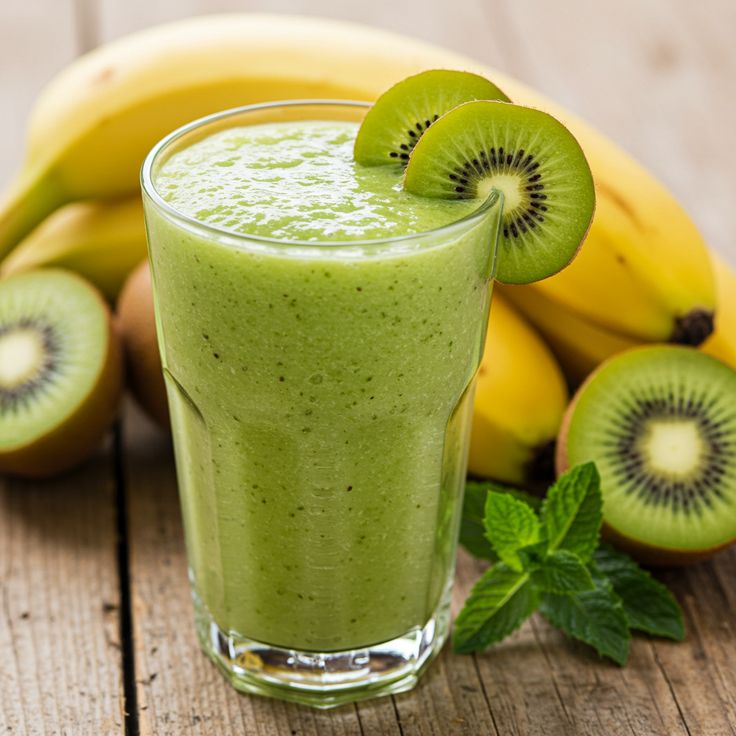
Image Credit: Pinterest
Ingredients:
- 2 ripe kiwis (peeled and chopped)
- 1 small banana
- ½ cup plain yogurt or curd
- ½ cup chilled milk
- 1 tsp honey (optional)
Method:
- In a blender, add kiwis, banana, yoghurt, honey, and milk. Blend all the ingredients until smooth.
- Serve immediately.
2. Kiwi Yogurt Parfait
Kiwi yoghurt parfait is an easy-to-make yet wholesome treat rich in probiotics, fiber, and natural sweetness. It is perfect for breakfast or a light dessert.

Image Credit: Pinterest
Ingredients:
- 1 cup low-fat yogurt
- 1 kiwi (sliced)
- ½ cup granola or oats
- 1 tbsp chopped nuts or seeds (optional)
- A drizzle of honey
Method:
- Layer yogurt, granola, and kiwi slices in a glass.
- Repeat the layers and top with nuts and a drizzle of honey..
3. Kiwi Spinach Salad
If you are looking for a light lunch or a side dish to your meal, this kiwi spinach salad is the go-to tangy salad. The freshness of kiwi pairs beautifully with spinach, offering an iron-rich, vitamin-packed salad.

Image Credit: Pinterest
Ingredients:
- 2 kiwis (peeled and sliced)
- 1 cup baby spinach leaves
- ½ cucumber (thinly sliced)
- A handful of pecan nuts and berries
- 1 tbsp olive oil
- ½ tbsp lemon juice
- A pinch of salt and pepper
Method:
- Toss all ingredients gently in a bowl.
- Sprinkle salt as per your taste and half a tablespoon of lemon juice to give the salad a kick.
- Voila, your kiwi spinach salad is ready!
4. Kiwi Mint Cooler
This drink is refreshing, hydrating, and soothing, especially helpful during morning sickness or when you need a gentle energy lift.
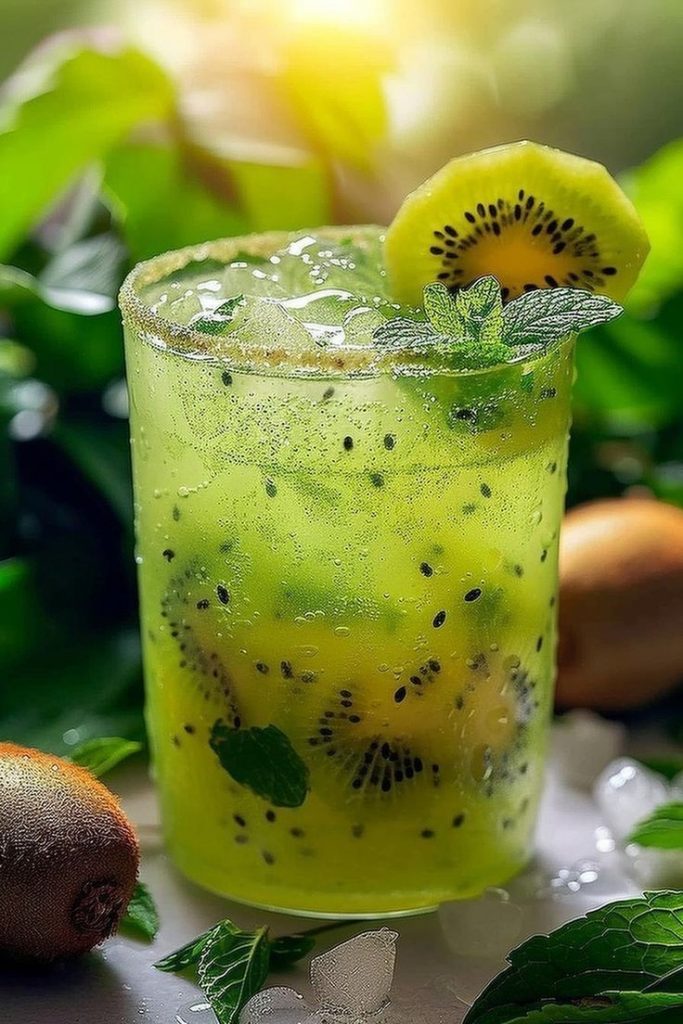
Image Credit: Pinterest
Ingredients:
- 2 kiwis (peeled and chopped)
- 4-5 mint leaves
- 1 tsp lemon juice
- 1 cup cold water or coconut water
- Honey (optional, to taste)
Method:
- Blend kiwi, mint, lemon juice, and water until smooth.
- Strain if you prefer a lighter texture.
FAQs
1. When is it unsafe to eat kiwi?
If you have had a history of birch pollen-associated food allergy, then you should avoid eating kiwi fruit (10). It is to be noted that those allergic to wheat, poppy seeds, hazelnuts, or figs may have a chance to develop an allergy to kiwi as well (11).
2. Can I have Kiwi Crush in pregnancy?
Yes, you can have Kiwi Crush during your pregnancy. However, it comes with a caution. It should be consumed within two to three days of refrigeration.
3. Does a kiwi craving during pregnancy indicate the gender of the baby?
Although there are numerous myths surrounding kiwi craving in pregnancy, there is no scientific evidence to back such claims (11).
4. Can I eat unripe kiwi in pregnancy?
Unripe kiwis are more acidic in nature than ripened kiwis. In case you overeat unripe ones, you may get sores in the mouth or tongue. To avoid the soreness and the ill impact of the acidic nature of kiwis, you may have them with yogurt or custard.
Watching your diet is essential during pregnancy since your body becomes vulnerable during this time. Kiwis can help provide certain nutrients for the body that would help the foetus to grow. However, they should be eaten in moderation, as too much of anything is bad.
Also Read:
Eating Bananas in Pregnancy
Consuming Mangoes while Pregnant
Can you Eat Pineapple during Pregnancy?
Eating Chikoo (Sapota) Fruit when Pregnant
Was This Article Helpful?
Parenting is a huge responsibility, for you as a caregiver, but also for us as a parenting content platform. We understand that and take our responsibility of creating credible content seriously. FirstCry Parenting articles are written and published only after extensive research using factually sound references to deliver quality content that is accurate, validated by experts, and completely reliable. To understand how we go about creating content that is credible, read our editorial policy here.
2. USDA – Kiwifruit, green, raw
4. PubMed Central – Dietary Neurotransmitters: A Narrative Review on Current Knowledge
5. PubMed Central – The nutritional and health attributes of kiwifruit: a review
6. MHNNS | Nutrition – Iron for pregnant women
7. PubMed Central – Diets for constipation
8. PubMed – Kiwifruit, carbohydrate availability, and the glycemic response
9. University of Nebraska-Lincoln – Fruits
10. PubMed – Kiwi fruit allergy: a new birch pollen-associated food allergy
11. NCT – Gender, positions and cravings in pregnancy: truth or myth






